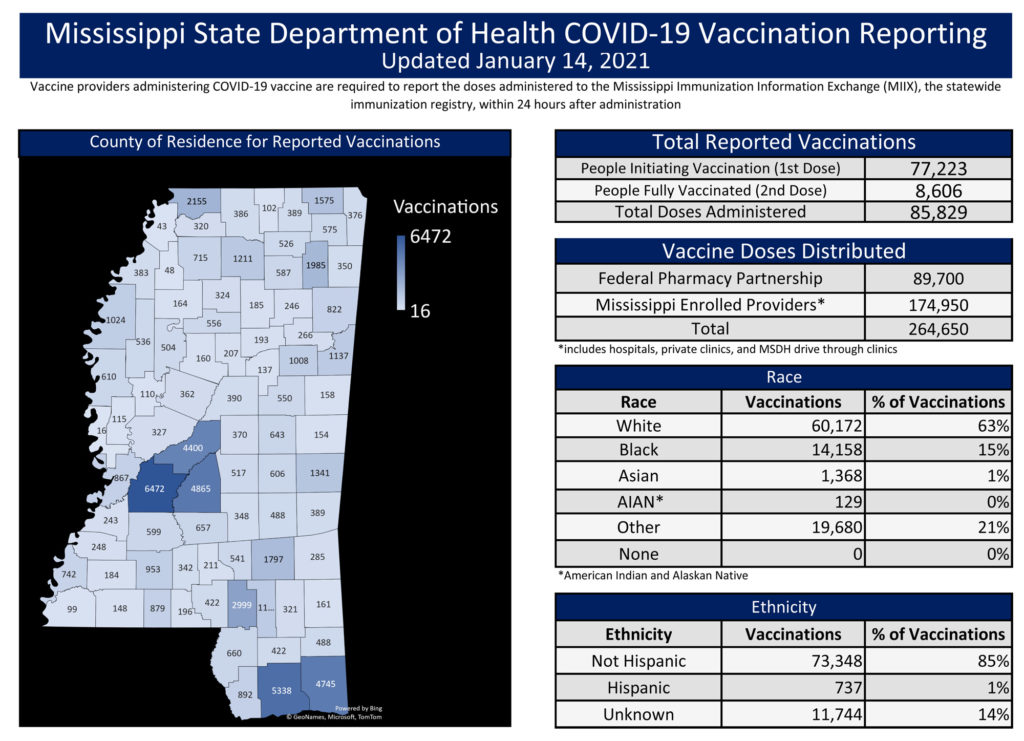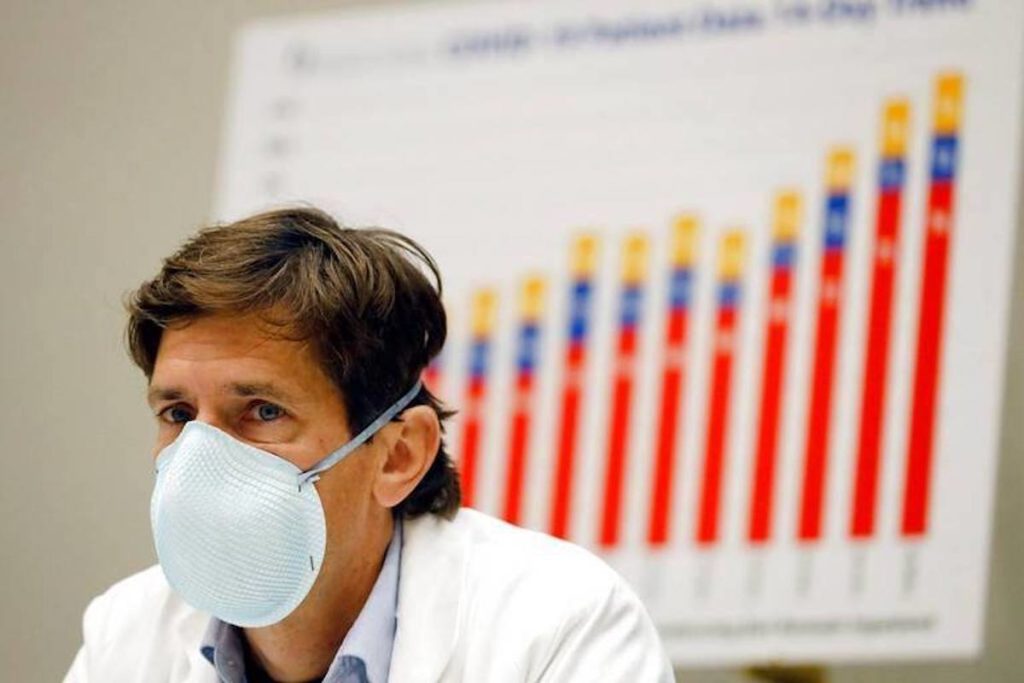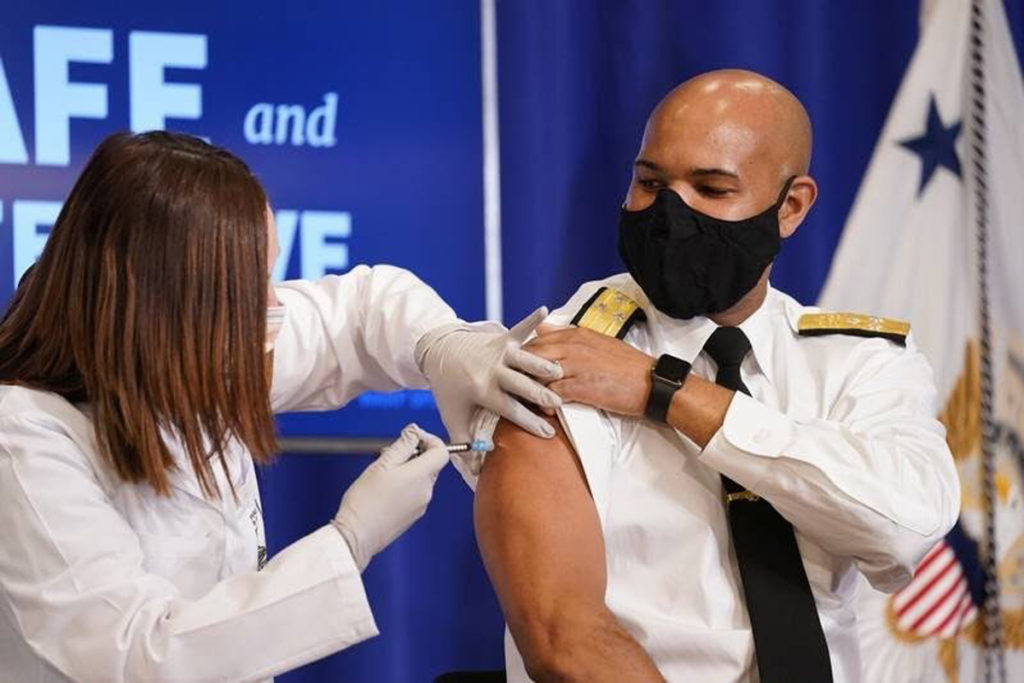Adam Booker, 34, watches the chaos and confusion surrounding the vaccine rollout in Mississippi as he has the rest of the pandemic: through a computer screen in a quiet room in Flowood.
When he was 19, a car accident left him in need of a diaphragmatic pacemaker, a system that stimulates his diaphragm and allows him to breathe without permanent ventilation. Like most residents of the state’s long-term care facilities, Booker is part of a distinctly at-risk community in the COVID-19 pandemic.

Yet due to extended delays in delivering the vaccine, Booker is not sure when he’ll receive his first shot. The ponderous delay is baffling to him,” Booker told the Mississippi Free Press in a Jan. 14 interview. “They came around late last year and asked if we’d be willing to take the vaccine.” But aside from chatter that the shots were arriving in late January, he waits alongside public-health leadership to see when his facility will receive the protection of the vaccine.
Outside of the state’s long-term care facilities, the vaccine rollout is charging ahead of schedule. The threat of the state receiving fewer doses of the COVID-19 vaccination in February may have motivated Gov. Tate Reeves’ decision to rapidly accelerate the rollout earlier this week. State Health Officer Dr. Thomas Dobbs acknowledged in a Thursday press event that, currently, states can expect to receive follow-up allocations based on how many shots they have successfully administered.
“Certainly that’s an issue now, because it’s going to be whatever you use, at least under the current administration. They may do distribution based on that,” Dobbs said. He acknowledged that this regime may change “past January,” implying that the Biden administration may take a different approach to vaccine distribution.
‘We Might’ve Done It Differently’
The primary culprit for Mississippi’s dangerously sluggish vaccination rate appears to be the corporate management of vaccinations for long-term care facilities. As the Mississippi Free Press previously reported, the federal contract directing Walgreens and CVS to manage the nation’s LTC vaccinations requires their own certified employees to deliver the shots.
Bizarrely, it appears that the requisite hiring push necessary to rapidly administer all of the incoming vaccinations had yet to be completed by January, with doses now waiting for patients in facilities perfectly capable of delivering the shots without outside help.
“Sadly—and knowing what we know now, we might’ve done it very differently—most of these doses … basically sat on the shelf with Pfizer and Walgreens for a while,” Dobbs said. The delay, for what should have been Mississippi’s most rapidly vaccinated population, was extremely damaging to the state’s overall metrics.
“That really slowed us down. We had to devote the vaccine up front for people in the nursing homes, but then it wasn’t activated and utilized,” Dobbs added.
Dr. Jennifer Bryan, chairwoman of the Mississippi State Medical Association, was less diplomatic than the state health officer. “The fact of the matter is, we’ve had the vaccine since the middle of December. There’s really no excuse that the residents of our long-term care facilities haven’t been vaccinated,” she told the Mississippi Free Press in an interview.

Still, with the help of the Mississippi Board of Pharmacy, the state health officer believes the long-term care facility effort is on the right track. The delay was “very disappointing,” Dobbs told the Mississippi Free Press in a statement, but added that “we have been leaning on them hard (and) expect to see acceleration.”
The state does have a backup plan if the corporate stakeholders continue their lethargic pace of vaccination. Long-term care facilities scheduled to receive the most distant first-dose clinics—the latest is scheduled for Feb. 11, around the time the third wave of Mississippians will be receiving vaccinations—may be selectively disenrolled from the federal contract. The Mississippi State Department of Health would then reclaim their vials of vaccine, delivering them to nursing homes and care facilities that could administer them independently.
The Mississippi Free Press asked Dobbs if that plan was active. “To be determined,” he replied.
A Sprint to the Finish
Leading the day’s press event was U.S. Surgeon General Dr. Jerome Adams, who fielded a variety of questions on the safety and effectiveness of the vaccines.
Adams defended the decision to proceed rapidly through the “tiers” of vaccine availability, something he previously urged states to do as the vaccine emerged, likening the challenge of mass vaccination to a sprint. “If we don’t stomp out this virus right now, there is every chance that it could mutate to a new strain that is resistant to the vaccine,” he said. “We’re just gonna keep prolonging the pandemic.”

Following Adams’ suggestion, on Tuesday, the State of Mississippi opened the floodgates on vaccination availability, radically altering the tiered access plan that had been in place since before the arrival of the Pfizer and Moderna vaccines. What followed was a frenzy of activity, burdening the University of Mississippi Medical Center-run appointment system to the point of near-collapse.
Within a day, more than 52,000 first-shot appointments had been scheduled for the coming weeks, accounting for all of the available first-shot supply allocated to the Mississippi State Department of Health for public consumption. Already, February appointments are available for those who qualify, potentially based on leftover doses from cancellations.
Plus, February should bring a significant new shipment of vaccine—one Dobbs suggested was coming at the beginning of the month, not the middle. A larger allocation could provide an opportunity for even wider access to the vaccine—the next step likely being various essential workers, from retail employees to restaurant servers.
‘At The Mercy of Others’
Booker resides at the Methodist Specialty Care Center in Flowood, and for most of 2020, he has been in total isolation. “There was a short, short window where we were doing good enough,” he said in the Jan. 14 interview. “They let us have one visitor a week, scheduled in advance. That lasted maybe a week and a half. I got to see two people during that time frame.”

Then, an infection in the facility sent them back to lockdown. “I almost got to see my dad and stepmom,” he said.
Booker is doing well, all things considered. He’s pleased with how Methodist Specialty Care Center has handled the pandemic, and considers himself relatively introverted, capable of coping with isolation. He received his bachelor’s in psychology from Millsaps in 2018, and is currently pursuing a master’s degree in social work at the University of Alabama, all from his room in the care facility.
Still, the lockdown periods are dreary, difficult times. “When someone tests positive, we have to shut our doors for two weeks. That’s a little much, even for me,” Booker said. “It sucks.”
And the pandemic, which looms in the air outside, occasionally piercing into the protective environment of the center, gives him a sense of helplessness he can’t quite shake.
“For us,” Booker said, “we can’t come and go. Even if we wanted to. The anxiety I feel comes from the fact that our health is at the mercy of others. We have to hope that the staff (taking care of us) does everything they can to keep us healthy. It’s out of our hands.”
“It’s a different level of being a sitting duck.”










